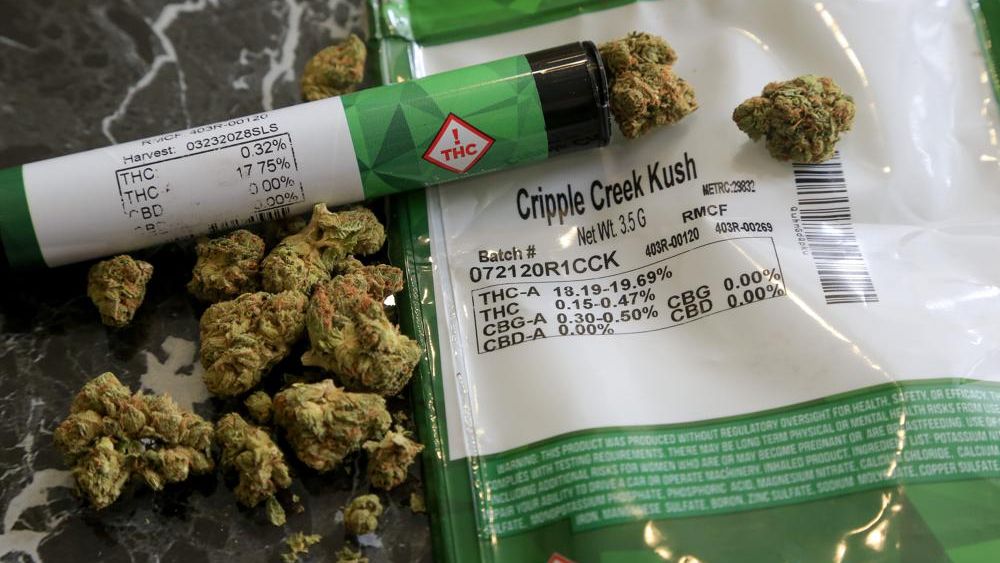ALBANY, N.Y. (AP) — More than 400 towns and villages across New York have opted to block local marijuana dispensaries and consumption lounges as a statewide deadline to do so nears, with many officials deciding to stay out of the upcoming market until regulators provide more clarity.
The law that legalized recreational marijuana in New York this year gives municipalities until Dec. 31 to “opt out” of hosting dispensaries or on-site consumption lounges once retail sales start in a year or so. Localities cannot ban legalized possession.
With three weeks left to act, more than a quarter of the New York’s towns and 31% of its villages had voted to become the cannabis equivalent of dry towns when it comes to dispensaries — at least initially. Numbers were slightly higher for consumption sites. Relatively few cities have officially opted out, and none of the state’s largest ones, according to an online tracker maintained by the Rockefeller Institute of Government.
Passage of the legalization law in March prompted local debates around the state, with residents touting the lifestyle and economic benefits of dispensaries facing off against people opposed to pot sales in their hometowns.
“We are concerned that dispensaries in our neighborhoods will normalize the use of marijuana even further than it already is,” said Anita Seefried-Brown of the Watertown-based Alliance for Better Communities, which is focused on reducing underage substance abuse.
Watertown, a city of 25,000 in northern New York, opted out after hearing from Seefried-Brown and other residents this summer.
Many local officials who voted to opt out said they were leery about green-lighting sales before the state Office of Cannabis Management provided more information about the market. Town boards like the one in Chautauqua in rural western New York opted out with the knowledge they could reconsider later when more details are in hand.
“The fact that they haven’t really published any rules or laws on it yet, it made us kind of nervous that, you know, what are we opting into? We don’t know yet,” said Chautauqua Supervisor Donald Emhardt.
The Office of Cannabis Management will compile the opt-out information so license applicants know which localities are off-limits.
Given the time needed to adopt regulations and grant licenses, dispensaries could open by the end of 2022, said Jeffrey Schultz, an attorney who represents cannabis interests. He said operations could open a bit earlier depending on how the state issues licenses.
As of Friday, 252 towns and 164 villages opted out of retail dispensaries. Municipalities typically opted out of both dispensaries and consumption sites. Though the numbers for consumption sites were higher: 279 towns and 179 villages, according to the Rockefeller Institute of Government.
“There’s no surprise that they’ve acted ahead of the deadline, and we expect some will chose to fully join the marketplace as we build a new, safe, regulated cannabis industry that protects public health and creates opportunity,” said Freeman Klopott, a spokesperson for the office.
Dispensary oppositions tended to break along generational lines in many places. In the Town of Goshen north of New York City, older people tended to support a ban with younger people saying local sales should be allowed, said Superintendent Douglas Bloomfield.
And passions ran high around the state.
“I didn’t see a whole lot of middle of the road people,” said Al Stauber, mayor of the Village of McGraw in central New York.
With interest so intense, the village board put the issue up to a vote last month. Residents who wanted local sales won by a single vote: 77-76.
“And if somebody would like to, perhaps, open a dispensary on our Main Street, which has a number of storefronts that are vacant and where everybody’s hurting for business, that could possibly be another revenue stream,” Stauber said.
New York’s marijuana market is shaping up to mirror other states where dispensaries can’t operate in every town and city.
In California, 70% of cities ban retail cannabis businesses, according to Hirsh Jain of Ananda Strategy. And in neighboring New Jersey, which also is moving toward a legal retail market, about 70% of the municipalities opted out of allowing multiple types of cannabis establishments, said Mike Cerra, executive director of the New Jersey State League of Municipalities.
But similar to New York, some towns that opted out before New Jersey’s Aug. 21 deadline might have taken a wait-and-see approach before regulations were issued.
“It appears that some of the towns that have opted out are now in the process of reconsidering,” Cerra said.



